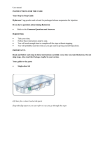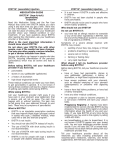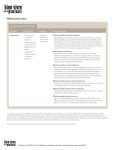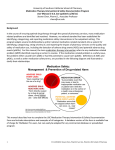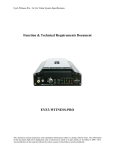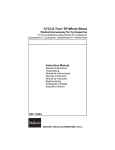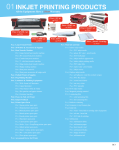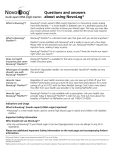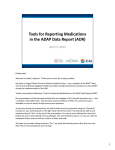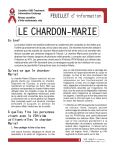Download Medication_Education_files/Byetta Patient Education
Transcript
Drug
Byetta
exenatide
Patient Education
Generic Name: exenatide (Byetta)
Pronounced: ex EN a tide
Brand Name: Byetta Prefilled Pen
What is the most important information I should know about Byetta?
This medication guide provides information about the Byetta brand of exenatide. Bydureon is another
brand of exenatide that is not covered in this medication guide.
Do not use exenatide to treat type 1 diabetes, or if you are in a state of diabetic ketoacidosis
(call your doctor for treatment with insulin). You should not use exenatide if you have severe kidney
disease (or if you are on dialysis), of if you have a severe stomach disorder that causes slow
digestion.
You should not use Byetta together with a fast-acting or short-acting insulin, such as insulin
aspart (NovoLOG), insulin glulisine (Apidra), insulin lispro (HumaLOG), or regular insulin
(HumuLIN R, NovoLIN R, and others). Do not use Byetta together with Bydureon.
You must use Byetta within 60 minutes (1 hour) BEFORE eating a meal. Do not use this medication
after eating a meal.
Stop using exenatide and call your doctor at once if you have severe pain in your upper
stomach spreading to your back, with nausea, vomiting, and a fast heart rate. These could be
symptoms of pancreatitis.
What is Byetta?
Exenatide is an injectable diabetes medicine that helps control blood sugar levels. This medication
helps your pancreas produce insulin more efficiently. Byetta is a short-acting form of exenatide.
Exenatide is used to treat type 2 diabetes. Other diabetes medicines are sometimes used in
combination with exenatide if needed.
This medication guide provides information about the Byetta brand of exenatide. Bydureon is
another brand of exenatide that is not covered in this medication guide.
Exenatide may also be used for purposes not listed in this medication guide.
What should I discuss with my healthcare provider before using Byetta?
Do not use exenatide to treat type 1 diabetes, or if you are in a state of diabetic ketoacidosis
(call your doctor for treatment with insulin). You should not use exenatide if you have severe kidney
disease (or if you are on dialysis), of if you have a severe stomach disorder that causes slow
digestion.
To make sure you can safely use this medication, tell your doctor if you have any of these other
conditions:
kidney disease or a history of kidney transplant;
problems with digestion;
a history of pancreatitis or gall stones;
a history of alcoholism; or
a history of high triglycerides (a type of fat in blood).
FDA pregnancy category C. It is not known whether exenatide will harm an unborn baby. Tell
your doctor if you are pregnant or plan to become pregnant while using this medication. Byetta can
make birth control pills less effective. If you take birth control pills, take your pill at least 1 hour
before your Byetta injection.
It is not known whether exenatide passes into breast milk or if it could harm a nursing baby.
Do not use Byetta without telling your doctor if you are breast-feeding a baby.
How should I use exenatide (Byetta)?
Use exactly as prescribed by your doctor. Do not use in larger or smaller amounts or for longer than
recommended. Follow the directions on your prescription label. Your doctor may occasionally
change your dose to make sure you get the best results.
Exenatide is injected under the skin. You may be shown how to use injections at home. Do not selfinject this medicine if you do not fully understand how to give the injection and properly dispose of
used needles and syringes.
Byetta is usually injected twice a day, before the morning and evening meal. You must use Byetta
within 60 minutes (1 hour) before eating the meal. Your Byetta doses should be given at least 6 hours
apart. Do not use Byetta after eating a meal.
Byetta comes in a prefilled injection pen with a "Pen User Manual" showing instructions for using
the pen and injecting the medicine. Follow these directions carefully. Ask your doctor or pharmacist
if you have any questions.
Never share an injection pen with another person. Sharing injection pens can allow disease
such as hepatitis or HIV to pass from one person to another.
Your blood sugar will need to be checked often, and you may need other blood tests at your doctor's
office. Visit your doctor regularly.
Know the signs of low blood sugar (hypoglycemia) and how to recognize them: headache,
hunger, weakness, sweating, tremors, irritability, or trouble concentrating.
Always keep a source of sugar available in case you have symptoms of low blood sugar. Sugar
sources include orange juice, glucose gel, candy, or milk. If you have severe hypoglycemia and
cannot eat or drink, use an injection of glucagon. Your doctor can give you a prescription for a
glucagon emergency injection kit and tell you how to give the injection. Be sure your family and
close friends know how to help you in an emergency.
Check your blood sugar carefully during a time of stress or illness, if you travel, exercise more than
usual, drink alcohol, or skip meals. These things can affect your glucose levels and your dose needs
may also change.
Your doctor may want you to stop using exenatide for a short time if you become ill, have a fever or
infection, or if you have surgery or a medical emergency. Tell your doctor if you have a prolonged
illness that causes diarrhea or vomiting.
Ask your doctor how to adjust your exenatide dose if needed. Do not change your medication
dose or schedule without your doctor's advice.
Store unused injection pens in the refrigerator, protected from light. Do not freeze, and throw
away any medicine that has become frozen. Do not use the medicine after the expiration date on the
label has passed.
After your first use of a Byetta injection pen, it may then be stored at room temperature, away
from heat and bright light. Do not store the exenatide pen with the needle attached. Use the pen for
only 30 days and then throw it away, even if it still has medicine in it.
Use a disposable needle only once. Throw away used needles in a puncture-proof container (ask your
pharmacist where you can get one and how to dispose of it). Keep this container out of the reach of
children and pets.
If the needle is left on, medicine may leak from the pen or air bubbles may form in the cartridge.
Keep your injection pen, pen needles, and all medicines out of the reach of children.
What happens if I miss a dose?
Use the missed dose as soon as you remember, but only if you have not yet eaten a meal. Skip the
missed dose if you have already eaten a meal, or if it is almost time for your next scheduled dose. Do
not use extra medicine to make up the missed dose.
What happens if I overdose?
Seek emergency medical attention or call the Poison Help line at 1-800-222-1222.
Overdose can cause severe nausea and vomiting, or signs of low blood sugar (headache, weakness,
dizziness, confusion, irritability, hunger, fast heartbeat, sweating, and tremor).
What should I avoid while using Byetta?
You should not use Byetta together with a fast-acting or short-acting insulin, such as insulin
aspart (NovoLOG), insulin glulisine (Apidra), insulin lispro (HumaLOG), or regular insulin
(HumuLIN R, NovoLIN R, and others). Do not use Byetta together with Bydureon.
Avoid drinking alcohol. It can lower your blood sugar.
If you take any type of antibiotic, take it at least 1 hour before you use Byetta.
What are the possible side effects of Byetta?
Get emergency medical help if you have any of these signs of an allergic reaction: hives;
difficulty breathing; swelling of your face, lips, tongue, or throat.
Stop using exenatide and call your doctor at once if you have a serious side effect such as:
swelling, weight gain, feeling short of breath, urinating less than usual or not at all;
drowsiness, confusion, mood changes, increased thirst, diarrhea;
dull pain in your middle or lower back;
severe pain in your upper stomach spreading to your back, vomiting; or
low blood sugar (headache, hunger, weakness, sweating, confusion, irritability, dizziness, fast heart
rate, or feeling jittery).
Less serious side effects may include:
nausea, upset stomach, diarrhea or constipation;
weight loss; or
loss of appetite.
This is not a complete list of side effects and others may occur. Call your doctor for medical advice
about side effects. You may report side effects to FDA at 1-800-FDA-1088.
What other drugs will affect Byetta?
You may be more likely to have hypoglycemia (low blood sugar) if you use exenatide with
oral diabetes medications that can lower blood sugar. Before using Byetta, tell your doctor if you use
any of these: chlorpropamide (Diabinese), glimepiride (Amaryl, Avandaryl, Duetact), glipizide
(Glucotrol, Metaglip), glyburide (DiaBeta, Glucovance), tolazamide (Tolinase), or tolbutamide
(Orinase).
Exenatide can make it harder for your body to absorb other medications you take by mouth.
Tell your doctor if you are taking:
levothyroxine (Synthroid, Levothroid);
lithium (Eskalith, Lithobid);
lovastatin (Mevacor, Altoprev, Advicor);
pimozide (Orap);
cyclosporine (Gengraf, Neoral, Sandimmune), sirolimus (Rapamune) or tacrolimus (Prograf);
theophylline (Elixophyllin, Theo-24, Theochron, Uniphyl);
birth control pills;
a blood thinner such as warfarin (Coumadin, Jantoven);
a diuretic (water pill);
ergot medicine such as ergotamine (Ergomar, Cafergot) or dihydroergotamine (D.H.E. 45, Migranal
Nasal Spray);
pain medication;
seizure medication such as carbamazepine (Carbatrol, Equetro, Tegretol), divalproex (Depakote),
ethosuximide (Zarontin), phenytoin (Dilantin), or valproic acid (Depakene, Stavzor); or
heart or blood pressure medication such as digoxin (digitalis, Lanoxin, Lanoxicaps), disopyramide
(Norpace), lisinopril (Prinivil, Zestril), procainamide (Procan, Pronestyl), or quinidine (Quin-G).
This list is not complete and other drugs may interact with exenatide. Tell your doctor about all
medications you use. This includes prescription, over-the-counter, vitamin, and herbal products. Do
not start a new medication without telling your doctor.
Where can I get more information?
Your pharmacist can provide more information about exenatide (Byetta).
Remember, keep this and all other medicines out of the reach of children, never share your medicines
with others, and use this medication only for the indication prescribed.
Copyright 1996-2012 Cerner Multum, Inc. Version: 12.02. Revision Date: 3/8/2012.
Every effort has been made to ensure that the information provided by Cerner Multum, Inc. ('Multum') is accurate, up-to-date, and complete,
but no guarantee is made to that effect. Drug information contained herein may be time sensitive. Multum information has been compiled for
use by healthcare practitioners and consumers in the United States and therefore Multum does not warrant that uses outside of the United
States are appropriate, unless specifically indicated otherwise.
Multum's drug information does not endorse drugs, diagnose patients or recommend therapy. Multum's drug information is an informational
resource designed to assist licensed healthcare practitioners in caring for their patients and/or to serve consumers viewing this service as a
supplement to, and not a substitute for, the expertise, skill, knowledge and judgment of healthcare practitioners. The absence of a warning for
a given drug or drug combination in no way should be construed to indicate that the drug or drug combination is safe, effective or appropriate
for any given patient. Multum does not assume any responsibility for any aspect of healthcare administered with the aid of information
Multum provides.
The information contained herein is not intended to cover all possible uses, directions, precautions, warnings, drug interactions, allergic
reactions, or adverse effects. If you have questions about the drugs you are taking, check with your doctor, nurse or pharmacist.
Substantial effort has been made to ensure that the information provided by Epocrates is accurate and up-to-date, but this information is not
intended to cover all possible uses, precautions, or other considerations relating to the therapies covered. Epocrates does not advocate or
endorse the use of any drug or other therapy and does not diagnose patients. Healthcare professionals should use their professional judgment in
using this information, and this information should not be considered a substitute for the care and professional judgment provided by a
licensed healthcare practitioner. This information if provided on an "as is" basis, and Epocrates and its affiliates, agents and licensors assume
no responsibility for any aspect of healthcare administered with the aid of this information or any other use of the information.
Copyright © 2013 Epocrates, Inc. All Rights Reserved.
Epocrates® Online is a trademark of Epocrates Inc, in the U.S. and elsewhere.






